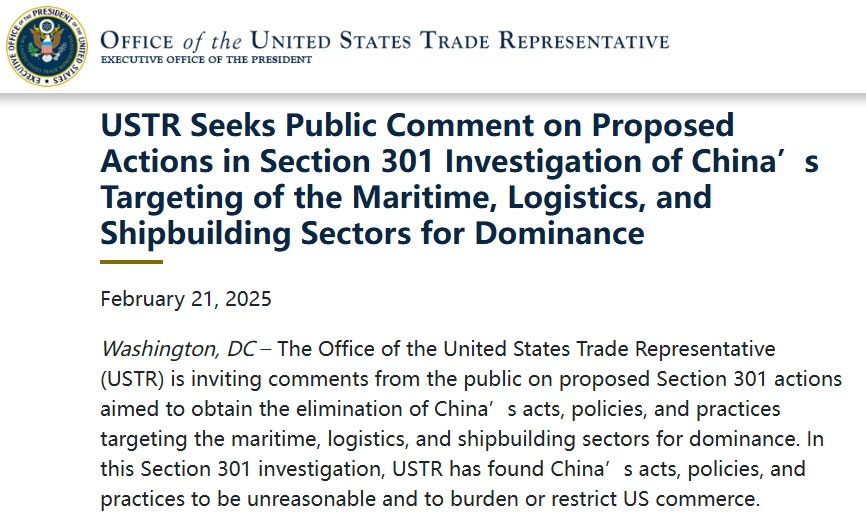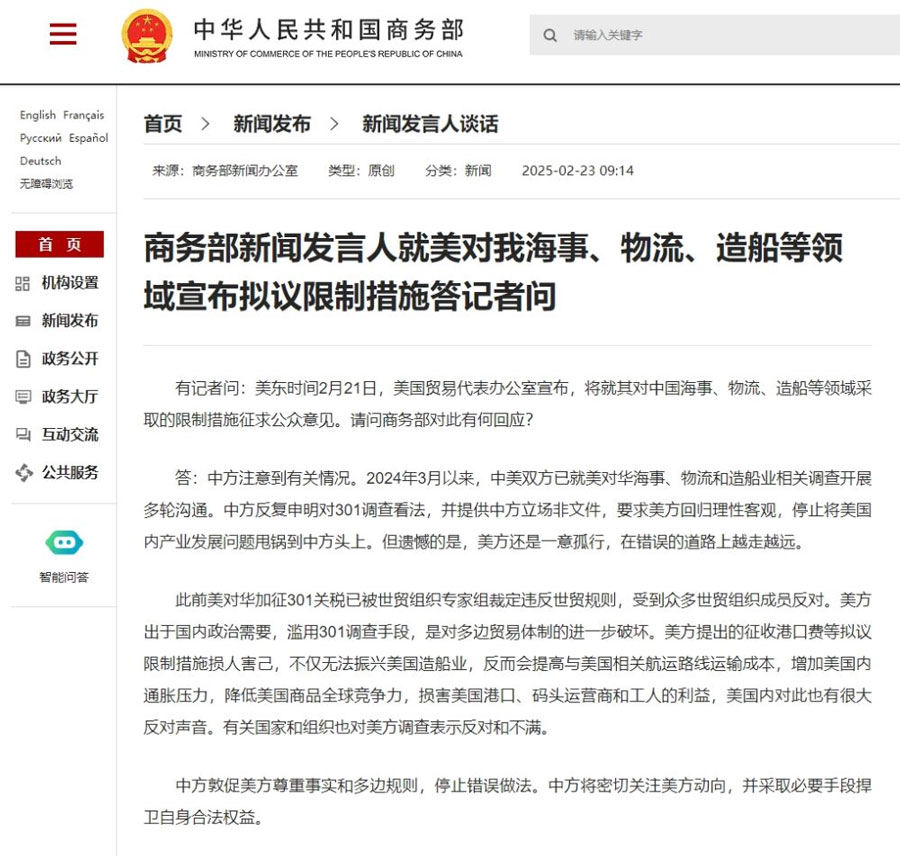

Us launches 301 investigation Hearing on China Shipping & Logistics and Shipbuilding!
On February 21, 2025, the Office of the United States Trade Representative (USTR) issued a notice announcing a public hearing on proposed actions in the Section 301 investigation against China's maritime, logistics, and shipbuilding industries. The investigation, based on a Section 301 proceeding launched in April 2024, purported to address "burdens or restrictions on U.S. commerce" imposed by China's "dominant" acts, policies and practices in those areas.
Us Trade Representative Katherine Tai said: "These petitions raise serious and concerning allegations that China has long sought dominance in the maritime, logistics, and shipbuilding industries, and cite unfair, non-market policies and practices that China has engaged in to achieve these goals." The allegations reflect what the United States has already seen in other industries, namely China's extensive use of non-market policies and practices to undermine fair competition in order to dominate Chinese and global markets. I pledge to conduct a full and thorough investigation into these union concerns."
The core elements of the proposed United States measures are as follows:
1. Fees for Chinese ship operators: Fees for Chinese ships entering U.S. ports on a single voyage are capped at $1 million, or $1,000 per net ton of cargo carried.
2. Charge for Chinese-built vessels in the fleet: Depending on the proportion of Chinese-built vessels in the fleet, the maximum charge for a single voyage is US $1.5 million (over 50%), US $750,000 (25%-50%) or US $500,000 (0%-25%).
3. Charge for operators ordering Chinese ships: if the proportion of Chinese ships in the order exceeds 50%, the charge for a single voyage is 1 million US dollars; 25%-50% charge $750,000; 0% to 25% charge $500,000.
4. Preferential policies for American ships: Operators who build ships in the United States can get up to $1 million/voyage fee reduction, and enjoy priority handling rights and port fee reduction.
5. Transportation restrictions: Phased requirements for U.S. exports to be carried on U.S. vessels, with at least 1% of cargo to be carried by the U.S. fleet starting in 2025.
To this end, the Ministry of Commerce held a press conference on February 21 to respond.
A: China has noted the relevant situation. Since March 2024, China and the United States have conducted several rounds of communication on investigations related to the US maritime, logistics and shipbuilding industries in China. China has repeatedly stated its views on the Section 301 investigation and provided non-documents on its position, asking the US side to return to rationality and objectivity and stop blaming China for industrial development issues in the US. But regrettably, the US is still going its own way and going further and further down the wrong path.
The 301 tariffs imposed by the US on China have been ruled by the WTO panel to be in violation of WTO rules and opposed by many WTO members. The abuse of Section 301 investigation by the US out of domestic political needs is further undermining the multilateral trading system. The proposed restrictions such as the imposition of port fees proposed by the US side will not only fail to revitalize the US shipbuilding industry, but will increase the transportation costs of US-related shipping routes, increase inflationary pressure in the US, reduce the global competitiveness of US goods, and damage the interests of US port and terminal operators and workers. There is also strong opposition in the US. Relevant countries and organizations also expressed opposition to and dissatisfaction with the US investigation.
China urges the US side to respect facts and multilateral rules and stop wrong practices. China will closely follow the moves of the US and take necessary measures to safeguard its legitimate rights and interests.

Us Trade Representative Katherine Tai said: "These petitions raise serious and concerning allegations that China has long sought dominance in the maritime, logistics, and shipbuilding industries, and cite unfair, non-market policies and practices that China has engaged in to achieve these goals." The allegations reflect what the United States has already seen in other industries, namely China's extensive use of non-market policies and practices to undermine fair competition in order to dominate Chinese and global markets. I pledge to conduct a full and thorough investigation into these union concerns."
The core elements of the proposed United States measures are as follows:
1. Fees for Chinese ship operators: Fees for Chinese ships entering U.S. ports on a single voyage are capped at $1 million, or $1,000 per net ton of cargo carried.
2. Charge for Chinese-built vessels in the fleet: Depending on the proportion of Chinese-built vessels in the fleet, the maximum charge for a single voyage is US $1.5 million (over 50%), US $750,000 (25%-50%) or US $500,000 (0%-25%).
3. Charge for operators ordering Chinese ships: if the proportion of Chinese ships in the order exceeds 50%, the charge for a single voyage is 1 million US dollars; 25%-50% charge $750,000; 0% to 25% charge $500,000.
4. Preferential policies for American ships: Operators who build ships in the United States can get up to $1 million/voyage fee reduction, and enjoy priority handling rights and port fee reduction.
5. Transportation restrictions: Phased requirements for U.S. exports to be carried on U.S. vessels, with at least 1% of cargo to be carried by the U.S. fleet starting in 2025.
To this end, the Ministry of Commerce held a press conference on February 21 to respond.

A: China has noted the relevant situation. Since March 2024, China and the United States have conducted several rounds of communication on investigations related to the US maritime, logistics and shipbuilding industries in China. China has repeatedly stated its views on the Section 301 investigation and provided non-documents on its position, asking the US side to return to rationality and objectivity and stop blaming China for industrial development issues in the US. But regrettably, the US is still going its own way and going further and further down the wrong path.
The 301 tariffs imposed by the US on China have been ruled by the WTO panel to be in violation of WTO rules and opposed by many WTO members. The abuse of Section 301 investigation by the US out of domestic political needs is further undermining the multilateral trading system. The proposed restrictions such as the imposition of port fees proposed by the US side will not only fail to revitalize the US shipbuilding industry, but will increase the transportation costs of US-related shipping routes, increase inflationary pressure in the US, reduce the global competitiveness of US goods, and damage the interests of US port and terminal operators and workers. There is also strong opposition in the US. Relevant countries and organizations also expressed opposition to and dissatisfaction with the US investigation.
China urges the US side to respect facts and multilateral rules and stop wrong practices. China will closely follow the moves of the US and take necessary measures to safeguard its legitimate rights and interests.





